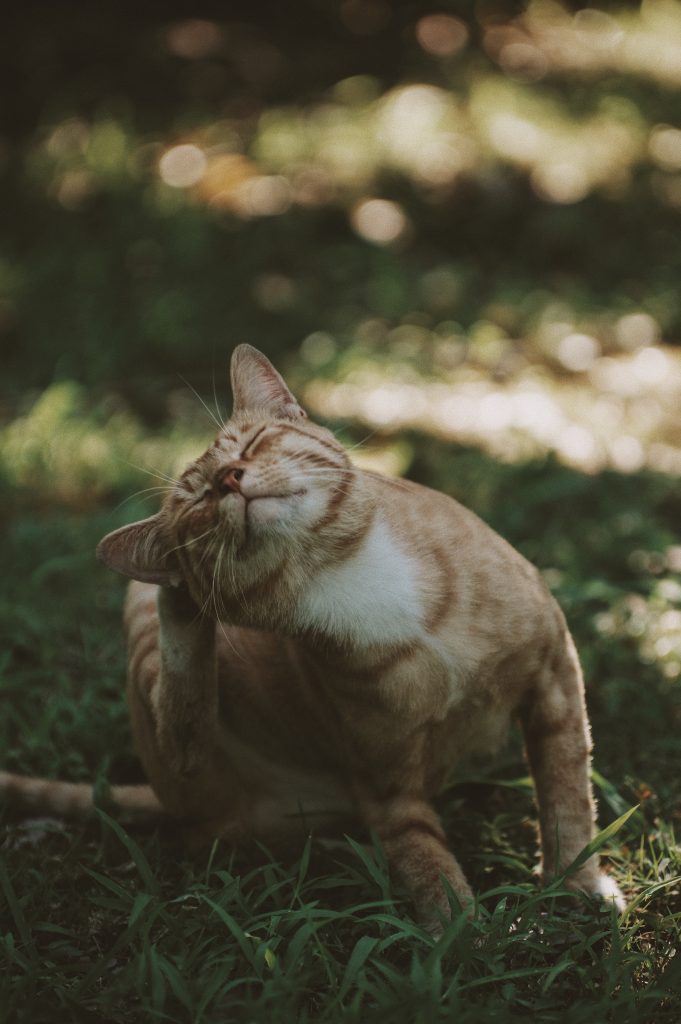Fleas in cats
Cat fleas are common parasites; they can be very annoying critters. They hide in the fur and cause itching and irritation. In severe cases, they can even cause your cat to become anemic or have an allergic reaction. Fleas can also carry pathogens. When fleas get from cats to humans, they can cause itching and skin lesions.
How does a cat become infected with fleas?
A cat is never actually infected by other animals or people. Cats get fleas by coming to a place where there is a pupated larva, ready to pounce on an animal. This can happen indoors and outdoors. Therefore, in addition to treating your cat, it is sometimes necessary to treat your home with anti-flea medication.
Can a cat that does not go outside also get fleas?

Cats that do not go outside can become infested with fleas just as easily. For example, fleas (eggs) can be carried inside on our clothes or under our shoes. Also, other animals such as mice or parasites (worms) can bring fleas into the house. We therefore recommend treating indoor cats against fleas as well.
How can you recognize fleas in cats?
- Fleas hide in your cat’s fur
- Most fleas nest in the neck
- A flea has a reddish-brown color and is about 2 mm in size
- Fleas can be identified by feces in the form of fine, black granules. These lie on the skin, cat basket and perhaps in your carpet.
- The cat is likely to suffer from additional itching
Check to see if your cat has fleas
You can check if your cat has fleas by combing him or her with a flea comb. If you find a flea, then it is obvious, but this is not always necessary. In that case, you can look for flea droppings. You can recognize this by small black grains in the coat. At first they look like sand, but if you put them on a wet tissue you will see that the grains turn red/brown. In this case, you know that it is flea poop and thus your cat most likely has fleas.
De-fleaing your cat or kitten
Your cat or kitten may suffer from fleas. This causes itching and before you know it, the fleas multiply. Do you detect fleas on your cat? Then you should de-flea the animal as soon as possible. We also recommend that you treat the cat preventively, you can read more about that later.
What is the best way to control fleas?
You can best control cat fleas with special anti-flea products. For example, a topical remedy (pipette or injection), a collar or a tablet. Do not forget to clean the living environment with special environmental spray and to wash pillows and blankets thoroughly. Finally, we recommend regularly deworming cats and checking for ticks.
Using a flea pipette on the cat
Many anti-flea remedies are in the form of a pipette. The pipette contains a liquid which must be applied to the skin. Do this between the shoulders/in the neck. This prevents your cat from licking the spot where you applied the product. Put the cat’s fur aside so that you can apply the drug as well as possible to the skin. The sebum layer in the skin will then absorb the product and cause it to be borne across the body. Wash your hands after applying the drops and then take care when petting.
An anti-flea tablet
An anti-flea product also comes in tablet form. Some cats dislike the feel of the drops on their skin, or sometimes administering a pipette can be inconvenient for owners. A tablet may then be a good option. You may break the tablets into smaller pieces and hide them in some treats to make it easier to give.
An anti-flea collar
The advantage of an anti-flea collar is that it has a long effect, usually 6 months. Putting the collar on is the same as a normal collar. We do recommend being alert when your cat goes outside. There is a risk that they may get caught on something with the collar and become trapped.
How often should I de-flea my cat?
We recommend protecting your cat from fleas year-round. There is a misconception that fleas only occur in spring & summer. But if there are fleas in the house, they remain active throughout the year. Often in autumn, when the heating inside turns on again, we see that a flea infestation can suddenly appear.
How often you should treat your cat depends on the product you use for this purpose. Most anti-flea products have an effect of one month. Nowadays there are also products on the market that give 3 months of protection. In addition, you have the anti-flea collar which, as told earlier, has an effect of 6 months.
De-fleaing your kitten
Kittens are extra vulnerable, so you need to take flea prevention extra seriously. When a kitten is just born, it is protected for the first 8 weeks by the nutrients in its mother’s milk. After that period, it is best to give an anti-flea (and worm) treatment right away. Make sure that the product is suitable for kittens, because this is not the case with all flea products. You can ask our staff for advice.
Cats with flea allergy
Some cats may suffer from flea allergy. In this case, the cat’s immune system reacts violently to the allergens found in the flea’s saliva. When a flea bites to suck blood, saliva from the flea enters the cat’s skin. Because of this, a flea bite can lead to intense itching and skin complaints. A single flea bite can cause a severe skin reaction.
If your cat has flea allergy, it is all the more important to give your cat proper and continuous treatment against fleas.
Is your cat still suffering from fleas?
Despite adequate flea control, does your cat or kitten still suffer from fleas? Most likely, there is a heavy infestation of the environment or an incorrect use of anti-flea products. Don’t worry, we are happy to help you fight fleas.
Please feel free to contact us!

Meet our team!
Would you like to know more about our veterinarians and nurses before making an appointment? Read more about our team here.

